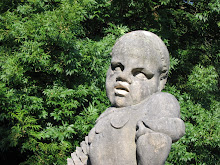Little Egypt ... more evidence
Note how it suggests very strongly that the epithet "Egyptian" for men of Glemsford predates the riot.
Glemsford at that time was a stronghold of liberalism while Melford was very largely tory, and the antagonism between the villages was strong and often bitter. The men of Melford jeered at the Glemsford men, calling them Egyptians, and said they were outsiders. The words Egypt and Glemsford were so synonymous that the confusion spilled over into our geography lessons; and when a Sunday school teacher asked where the baby Jesus was taken when Herod threatened to kill all the babies, the answer came promptly: Glemsford!
Thanks, Alasdair
You can access the whole article from which the extract is taken by clicking on the title of this entry.


1 Comments:
Hello Steve
Just a thought about Glemsfords link with a posiable Gypsy past and it's name of Little Egypt.
How long has the Amusment Fare been arriving in Glemsford. Is this a modern thing or has it been happening for many years?
Most modern fares are on sites that pre date the fares we now know. For example, the Melford fare was once a large Horse Fare and attracted a lot of Gypsyies, horse trading being one way of making money. Indeed the Showmen that ran the early amusment fares needed good horses for thier own travelling. They therefore attended these horse fares and set up amusments whilst there.
100 years on the amusment fare still arrives, the horse selling is a distant memory.
Did Glemsford have a horse fare 150-100 years ago?
When did the amusment fare run by the Showmen arrive?
Did the amusment fare ever "over winter" in Glemsford? Fare people often got called Gypsies by the settled populstion by mistake.
Here is an abridged quote from Ward-Jackson and Harvey's book "The English Gypsy Caravan" 1972.
"Although the Showman pride themslves, and still do, on their separatness from even the best born Romanies, both classes had a close community of economic interest. To the Showmen horses well being was vital, and few equalled the Gypsies as traders and farriers. Also as fortune tellers thier women were renowned. These interests alone sufficed to bring and keep the two classes together, yet each held the other very much at a social distance.
Maybe some folk of Glemsford have knowledge of the amusment fare and the length of time it has been arriving.
All the best
Rory
Post a Comment
<< Home